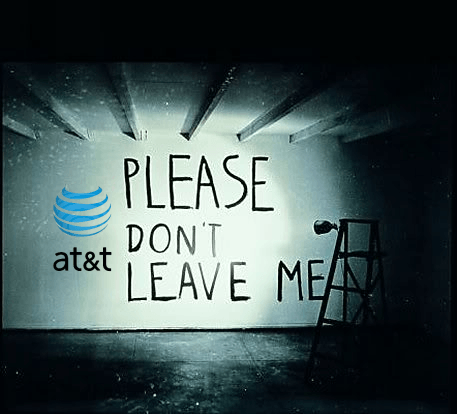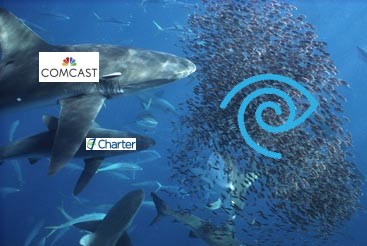 Is your promotion with AT&T U-verse coming to an end? Are you actually paying regular price for Internet, phone, or television service? Why?
Is your promotion with AT&T U-verse coming to an end? Are you actually paying regular price for Internet, phone, or television service? Why?
“AT&T will do whatever we can to keep your business,” an AT&T customer retention specialist tells Stop the Cap! “If you seem serious about canceling service by quoting us rates from one of our competitors, we will give you an even better deal to stay with us with faster speeds and a lower price.”
AT&T has been attempting to improve its “promotional churn” numbers — the percentage of customers who switch to AT&T U-verse with a special deal only to cancel after the promotion ends. So far, it seems to be working, especially in the Midwest where AT&T’s pricing has been so aggressive, Time Warner Cable admitted it has had trouble keeping customers and winning former ones back.
Providers are especially vulnerable when promotional packages expire and rates reset to the regular retail price, often $30-80 or more a month, depending on the number of services. When the first bill reflecting non-promotional pricing arrives, a lot of customers with bill shock consider their options and some leave for a better offer elsewhere.
Time Warner Cable handles this by offering a less generous, follow-up promotion when the original one expires. AT&T usually waits until customers try to cancel service before a “customer retention” specialist goes to work to save the account.
An AT&T customer service representative working in AT&T’s customer retention department talked with Stop the Cap! this week about AT&T’s current pricing and promotions, but requested anonymity because she was not authorized to speak with the media.
“When a customer calls in and asks to cancel service, those calls are automatically passed on to our department to change the customer’s mind,” says our source. “We take calls of all kinds including profanity-laced, ‘one-way’ conversations from angry customers upset about poor service, those fishing for a better deal, and those that have already set up an installation appointment with a competitor.”

“We are trained to resolve customer concerns, so the guy who loses U-verse service during Sunday football doesn’t need a lower rate, just a serious effort to stop those outages from repeating,” says our source. “We’re worried the most about customers who can quote our competitor’s best promotional offer and are prepared to switch immediately. These customers are clearly price shopping so we have to find ways to lower our price, improve our service, or a combination of both or the customer will walk.”
With U-verse still being a relatively new product, AT&T invests a considerable amount of money to provision service to new customers. To recoup that investment, AT&T needs customers to maintain service for at least a few years. If a customer cancels as soon as their promotion expires, AT&T will lose part of that investment.
“It is actually better for us to upgrade your service and even cut your price than to lose your business, so we do exactly that,” our source says. “That is why our best retention offers are not available to new customers. That is actually a good thing in my view because we’re treating our current customers better than those who are not,” she adds.
Stop the Cap! has assembled a guide to help current AT&T U-verse customers snag one of these retention deals and save. However, please be aware your results can vary based on a number of factors including: your past payment history (chronic late-payers will not qualify for the best offers), the level of competition in your area, the customer service agent you are dealing with, and the perceived seriousness of your threat to cancel service.
We have focused most of our attention on the broadband part of U-verse, but those with bundled service can also get some attractive retention deals.
“It doesn’t hurt to ask even if you are still on a contract,” says our source. “Although we won’t give contract customers the best deals, we can often offer a free speed upgrade through the customer retention department.”
What about U-verse’s 250GB usage cap?
“It’s not enforced in most areas and I’ve never seen a customer call to cancel because they had overage fees on their bill,” says our source. “If they did, I’m sure we’d just credit them. I don’t see us losing a customer over this.”
Getting Prepared
 You will be calling AT&T. Do not bother using their online chat support, e-mail, or snail mail to ask for a better deal. You will not get one. AT&T’s approach to customer retention requires a specially trained representative to speak with the customer by phone.
You will be calling AT&T. Do not bother using their online chat support, e-mail, or snail mail to ask for a better deal. You will not get one. AT&T’s approach to customer retention requires a specially trained representative to speak with the customer by phone.
Visit the website(s) of the cable company and any other competitors serving your area. You will need to have specific pricing and service details handy when asking AT&T for a better deal. “Don’t make it up, because we will likely take a look at the same information you found and point out any fine print that might make a competitor’s deal less attractive,” says our source. “We are asked to document these details in the notes we place on your account. These are available to any other representative that looks at your account.”
Think about what is most important to you, upgraded service for the same price or a lower bill. The representative will have a few different retention offers to choose from, and in some cases a supervisor may need to authorize the better-priced deals. Most will require a one-year term contract.
Making the Call
 A lot of customers want a better deal but don’t want to feel stressed out asking for one. Don’t worry. In most cases the entire process will take less than 15 minutes. But it helps if you can call when you are free of distractions or pressured for time. Hold times might vary and in some cases a less-than-helpful representative might require you to start negotiations over with someone else.
A lot of customers want a better deal but don’t want to feel stressed out asking for one. Don’t worry. In most cases the entire process will take less than 15 minutes. But it helps if you can call when you are free of distractions or pressured for time. Hold times might vary and in some cases a less-than-helpful representative might require you to start negotiations over with someone else.
Have paper and pen ready to take notes. You will want to write down the name and extension of the representative and details about the types of retention plans being offered, especially if AT&T manages to ‘lose the paperwork.’
Do -not- call AT&T’s regular customer service number. Instead, call 1-800-288-2020. You will be prompted to select your state, asked for the phone number associated with your account, and offered a menu of choices to proceed. You need to say or select the option to “cancel service.” This will route you directly to a customer retention specialist.
Making Your Case

You: I am calling to cancel my U-verse service. I have been offered a better deal with the cable company.
AT&T: Really? We don’t want to lose you as a customer so let me pull up your account. Can you tell me what our competitor is offering?
At this point, you want to quote the deal you found on the competitor’s website and quote the offer. Let the representative know you are switching because of the price and/or features.
An alternative approach that has also proven effective:
You: I just received an offer from my cable company that has made me seriously consider switching but I wanted to reach out to AT&T to see what you could do to keep my business. I’d like to learn what promotions I might qualify for.
AT&T: Let me check. Tell me what the competitor is offering you.
You: (Describing the offer) There are certain things I like about the offer from the cable company but I could be persuaded to stay with U-verse. I am just concerned because for the amount you charge for broadband service, I can get faster speed at a lower price with the cable company. Are there any promotions that can boost my speed and offer me a better deal?
 When the representative comes back on the line, they will usually offer a small discount or service credit ranging from $5-10. But better deals come to those who hold out.
When the representative comes back on the line, they will usually offer a small discount or service credit ranging from $5-10. But better deals come to those who hold out.
You: My neighbor is getting a better deal than that. He received a speed upgrade and is paying something close to half the regular price for the next year. Is there anything like that available?
AT&T: Let me check. Yes there is, but I will need to speak to my manager.
“When we put you on hold to ‘speak to a manager’ this usually means we are putting notes on the account to justify the higher value retention deal we are about to offer,” says our source. “But if something unusual comes up, like a one-time credit or waiving an equipment fee, we may need a supervisor’s approval.”
Stop the Cap! has verified some valid U-verse retention deals that are commonly available throughout the United States. In some highly competitive areas, these deals are often sweetened with a $100 service credit instantly applied to your bill. You can always ask. Although AT&T might offer some of these for six months, most can be extended to 12 months upon request. Be ready to commit to AT&T for the next year to avoid any early termination penalties in the typical 12 month term contract that comes with these offers.
It is important to be flexible and don’t fixate on any particular element in an offer. A representative may not be able to waive surcharges like a modem rental fee (buy your own) or a Local TV Surcharge, but they can usually find a deal that more than compensates you with a much-reduced rate.
 If the representative seems reluctant to extend an offer to you, thank him or her for their time and call back and speak with someone else. Some AT&T representatives are more helpful than others.
If the representative seems reluctant to extend an offer to you, thank him or her for their time and call back and speak with someone else. Some AT&T representatives are more helpful than others.
Frequently Seen U-verse Promotions
- Broadband-only service: 3Mbps for $14.95/mo, 6Mbps for $23, 12Mbps for $25, 18Mbps for $28, or 24Mbps for $33 (Buying your own modem avoids rental fees but if you plan to rent, ask if there are any promotions that reduce or waive the fee);
- Bundled TV/Internet Service: The most commonly available offers bundle 18Mbps broadband with U300 service at prices that range from $101-103, although $104/month can upgrade you to 24Mbps with U300 in certain parts of Florida. (1-yr contract)
“We really aren’t routinely offering many deals for speeds above 24Mbps because too many customers don’t qualify for faster service,” says our source. “Offering something they can’t get only further disappoints them, which is something we prefer to avoid.”


 Subscribe
Subscribe Can you drop by your local supermarket and walk out with a year of free home broadband service? In the United Kingdom, Tesco shoppers can.
Can you drop by your local supermarket and walk out with a year of free home broadband service? In the United Kingdom, Tesco shoppers can. News that there were two potential rivals for Time Warner Cable excited investors, particularly when it was revealed possible suitor Comcast is also separately talking to Charter about a possible joint bid that would split up Time Warner Cable customers while minimizing potential regulatory scrutiny.
News that there were two potential rivals for Time Warner Cable excited investors, particularly when it was revealed possible suitor Comcast is also separately talking to Charter about a possible joint bid that would split up Time Warner Cable customers while minimizing potential regulatory scrutiny.

 Ironically, when Malone sold TCI to AT&T, the telephone company would later sell its cable assets to Comcast, run by… and Brian Roberts.
Ironically, when Malone sold TCI to AT&T, the telephone company would later sell its cable assets to Comcast, run by… and Brian Roberts.

 That $1 billion could be a key part of any blockbuster buyout deal because Malone can leverage that and other money with an even larger infusion from today’s easy access capital market. He has done it before, leveraging countless buyouts of other cable operators that built Malone’s Tele-Communications, Inc. (TCI) into the country’s largest cable operator by the early 1990s.
That $1 billion could be a key part of any blockbuster buyout deal because Malone can leverage that and other money with an even larger infusion from today’s easy access capital market. He has done it before, leveraging countless buyouts of other cable operators that built Malone’s Tele-Communications, Inc. (TCI) into the country’s largest cable operator by the early 1990s. Khan believes Malone laid his consolidation foundation with Liberty’s significant ownership interest in Charter Communications, from which he can build a new cable empire.
Khan believes Malone laid his consolidation foundation with Liberty’s significant ownership interest in Charter Communications, from which he can build a new cable empire.
 Critics contend satellite broadband is not a good long-term solution except in the most rural of sparsely populated areas. Although providing wired service may be too costly, ground-based wireless services could be the most capable technology to contend with future demand and capacity concerns.
Critics contend satellite broadband is not a good long-term solution except in the most rural of sparsely populated areas. Although providing wired service may be too costly, ground-based wireless services could be the most capable technology to contend with future demand and capacity concerns.